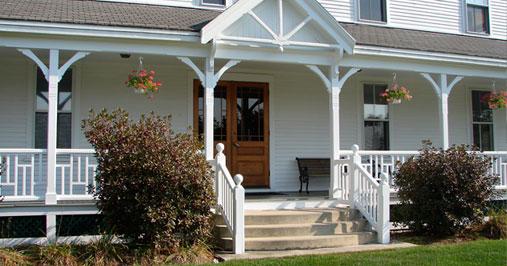Location
Editor: This is one of a series of stories by Silver Spring Baha'is - we've asked them how they first learned about the Baha'i Faith and what that experience held.
Brian P.: I learned about the Baha'i Faith from my mother, and she had learned about it from my grandfather. My grandfather was born in the late 1800s, and grew up in Minneapolis, literally on the street. He left home after dropping out of the third grade - his father had died, his mother was supporting many children, and times were hard. He and those of his brothers who could fend for themselves took to theiving, sleeping in alleyways, living the life of the street - whatever kept them alive.
In my family, his stories of life as a child and young man have passed down, muted and changed perhaps, but one fact came through to me - my grandfather was adrift on the very fringes of society, completely without conscience or moral qualm. He drifted this way, commiting acts of violence and casual cruelty along the way, until he inevitably was jailed after being arrested during a robbery. He thought little of it.
A Baha'i, attorney Albert Hall, took on my grandfather's case as a public defender, and for reasons my grandfather could never understand or fathom, he also introduced my grandfather to the Baha'i Faith. Perhaps Mr. Hall could see a soul deeply in need of hope, purpose, upliftment hiding within a hardcase criminal. He offered my grandfather a book of the Baha'i Holy Writings.
Even more astounding than this act of spiritual generosity, perhaps, was my grandfather's response. He agreed to take the book and read it - but on one condition. He asked Mr. Hall to bring him a dictionary - he could only read at the third grade level, and he couldn't puzzle out many of the words. Mr. Hall obliged, and later - as my grandfather literally broke out of the Minneapolis jail and went on the run to avoid prison - my grandfather took the dictionary and Holy Writings with him.
Growing a beard to avoid being recognized, hiding out in the then-near-deserted "bad lands" of North Dakota, my grandfather worked his way through that book, and a change began in him. Though he remained a fled-fugitive, his spiritual journey culminated in 1912 when he jumped freight train after freight train, dodging railroad police, to visit Abdu'l-Baha during his visit to America. He caught up with Abdu'l-Baha in Green Acre, Maine.
Arriving dirty, bedraggled, and every inch the criminal his life had led him to be, he approached believing that he might be allowed to see this man whose father had revealed the Holy Writings he had read. Imagine then his surprise when Baha'is welcomed him into their houses to clean up, and when Abdu'l-Baha summoned him, an uninvited and unworthy guest, to his table and presence. Abdu'l-Baha, hearing my grandfather's story of travel and trial, embraced him and kissed the dirty Fedora my grandfather held in his hand. My grandfather's heart blossomed that day, and he was never the same man.
As a child, sneaking into my mother's room, I would delicately open the old hat box, lift out that Fedora, and place it on my own head. My grandfather's grandson, his hat fit me. But I could only imagine what the experience had been for him, how it transformed him.
My grandfather "went legit," took on a life-long profession in newspaper printing, married a Baha'i woman, raised five children, and served his Baha'i and non-Baha'i community his whole life. My childhood was full of his stories - of bringing home drunken indigents in danger of freezing on the streets of Chicago, of tirelessly unceasingly teaching about the power of spirituality to transform individuals, lives, families. A favorite of mine as a child was the story of my grandfather attending an illicit American Communist meeting in the early 1930s - to press his case that the world's woes were spiritual in nature, and that politics and economics held no answers for problems they could not understand. The police busted up the meeting, with my grandfather relying upon his old skills of evasion to avoid being jailed as a subversive! He died before my mother was even eighteen years old, literally packing his bags to travel yet again teaching. I cannot but help thinking he saw, perhaps, himself in the suffering and adrift souls, these rabble rousers desperately seeking some way, some mechanism to change the world. He offered them his hand.
As I've meditated on my grandfather's transformation, this redemption, I've been increasingly overcome with feelings of gratitude. My grandfather's transformation was more than his personal journey - it was the foundation for my entire family, for my mother, for myself, for my children. To be sure, we've each had our own journey. But without my grandfather's redemption, I would perhaps not understand the power latent in spirituality - a power which politics, policy, society, and economics could not give my grandfather. The power of transformation, even for the most forlorn.
My grandfather's hat is rightfully preserved now in the Baha'i Archives. I hope that when other people look at that hat, they feel what I felt slipping it on all those years ago: the certainty that transformation is possible, even for the most forlorn.
Read more about Brian's grandfather, Fred Mortensen, here.
Photo courtesy of Green Acre Baha'i School


